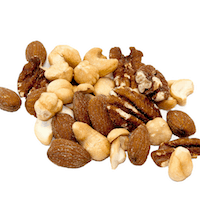A Mediterranian diet is not only healthy; they may help with weight loss.
I remember in the past year being taught that a low-fat diet is a way to go but as I indicated, this is a thing of the past. Now research is overwhelmingly abundant that it is not fat, but the type of fat that you eat that predisposes you to obesity, heart disease metabolic syndrome, and diabetes. One study that I discussed on Tuesday reviewed the fact that a Mediterranean diet can reverse metabolic syndrome, but can it help with weight loss?
One Spanish study that was published in August of 2016 looked at this question[1]. This research was published in The Lancet and it looked at 7447 asymptomatic adult subjects. The subjects were assigned to one of three interventions: a Mediterranean diet supplemented with extra-virgin olive oil, a Mediterranean diet supplemented with nuts, or a control diet in which they were advised to go a low-fat diet.
Participants in all three groups had marginally reduced body weight and increased waist circumference. At the
five-year mark, changes in body weight in the Mediterranean diet with olive oil and nuts were 0·43 kg and 0·08 kg when compared with the control group respectively. At that same interval, the changes in waist circumference in the Mediterranean diet with olive oil and nuts were 0·55 cm and 0·94 cm when compared with the control group.
-
Esposito, K, MI Maiorino, M Ciotola, Palo Di, P Scognamiglio, M Gicchino, M Petrizzo, et al. “Effects of a Mediterranean-Style Diet on the Need for Antihyperglycemic Drug Therapy in Patients with Newly Diagnosed Type 2 Diabetes: A Randomized Trial.” Annals of Internal Medicine 151, no. 5 (September 1, 2009): 306–14. [PubMed]
-
Esposito, Katherine, Raffaele Marfella, Miryam Ciotola, Carmen Di Palo, Francesco Giugliano, Giovanni Giugliano, Massimo D’Armiento, Francesco D’Andrea, and Dario Giugliano. “Effect of a Mediterranean-Style Diet on Endothelial Dysfunction and Markers of Vascular Inflammation in the Metabolic Syndrome.” JAMA 292, no. 12 (September 22, 2004): 1440. doi: 10.1001/jama.292.12.1440
-
Estruch, Ramon, Miguel Angel Martínez-González, Dolores Corella, Jordi Salas-Salvadó, Montserrat Fitó, Gemma Chiva-Blanch, Miquel Fiol, et al. “Effect of a High-Fat Mediterranean Diet on Bodyweight and Waist Circumference: A Prespecified Secondary Outcomes Analysis of the PREDIMED Randomised Controlled Trial.” The Lancet Diabetes & Endocrinology 4, no. 8 (August 2016): 666–76. doi: 10.1016/s2213-8587(16)30085-7 [Source]
-
Shai, Iris, Dan Schwarzfuchs, Yaakov Henkin, Danit R. Shahar, Shula Witkow, Ilana Greenberg, Rachel Golan, et al. “Weight Loss with a Low-Carbohydrate, Mediterranean, or Low-Fat Diet.” New England Journal of Medicine 359, no. 3 (July 17, 2008): 229–41. doi: 10.1056/nejmoa0708681









Leave a Reply